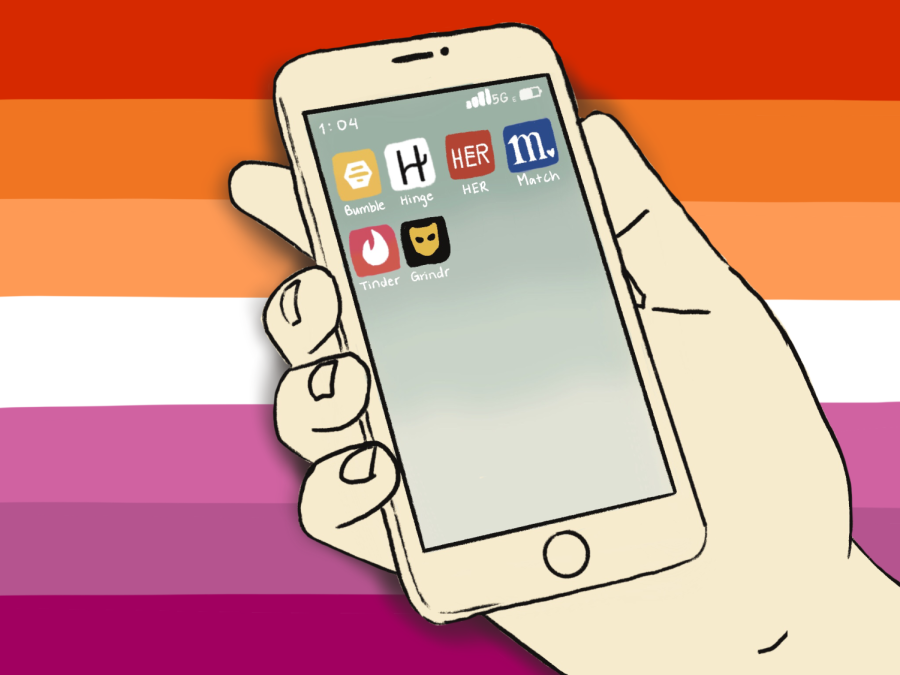It almost feels parodic at this point: A queer kid struggles to find community in the suburbs, dreams of moving to New York City and eventually makes it there. It’s a place where they can explore their sexual identity, confidently express themself and find spaces with like-minded people. It’s a trope employed perpetually in popular culture, and one that I admittedly once engaged with.
During my first semester at NYU, I walked by the Stonewall Inn, picnicked right next to the Ramble and longed to party at the Duplex. The lingering pandemic still prohibited nightlife, but I was confident that the queer community would be ready and waiting when restrictions were lifted. So imagine my disappointment upon finding a meager three bars catering to queer women.
I would be remiss not to acknowledge the role that the internet played in this. The internet has long served as a tool for LGBTQ+ individuals, providing a space to anonymously explore identity, access invaluable resources and find community. As a study by Smith College concludes, “The internet helped them realize there were people out there ‘like’ them; and even if they did not know anyone personally who would also identify as LGBTQ, knowing there were others like them eased their isolation.”
People who are queer — and outside of the cisgender, white, male paradigm — don’t enjoy the same digital presence. The most comparable dating app for queer women, Her, does not nearly enjoy the same cultural presence — or financial success — that Grindr does. Hinge, a dating app that gears itself more toward those seeking relationships, frequently touts its resources for LGBTQ+ users. However, Hinge is also a company founded by a heterosexual man and it sometimes feels as though queer people were an afterthought in the app’s design. Bumble, founded by a heterosexual woman, has sought advice from LGBTQ+ organizations such as GLAAD in order to expand its spectrum of gender identity options on the app.
In both of these cases, LGBTQ+ considerations seem to have been added as an afterthought to platforms made by straight people, for straight people. Grindr, by comparison, is made by gay men, for gay men, and has achieved resounding financial and cultural success.
So why the incongruity? There is a wide range of sexist and homophobic stereotypes plaguing queer women — the outdated phrase “lesbian bed death” illustrating a lack of sexual desire among lesbians, socioeconomic factors discouraging women from creating physical or digital spaces and, perhaps most infamously, the omnipresence of queer women as a figure for male arousal in pornography. In an interview with New York Magazine, Lea DeLaria, executive producer of the “Lesbian Bar Project,” coined this as “lesbian chic,” saying that “Lesbian chic was used by the media and the industry and especially Hollywood — very guilty of it — as a spank bank for straight men. Straight men have this lesbian fantasy thing where they think that they’re going to slide in between us.”
I can personally vouch for the effect this media trend has had in my life, from being incessantly questioned on the exact percentages of my attraction to different genders to being called a dyke by the same boy who kissed me months later — all to prove that any non-heterosexual leanings on my end were purely for show, and that, somehow, my true allegiance was to men all along.
Statistics show that more women than men identify as queer in the United States, a statistic that doesn’t even include the vast population of non-binary folks. When it comes to physical spaces in New York, there are 33 gay male bars in Soho, Chelsea and Greenwich Village alone, whereas there are only three lesbian bars in the whole state. When it comes to digital spaces, the discrepancy is equally jarring.
A notable, albeit somewhat fringe, exception to this is the app Lex — created by queer people, for queer people. The app doesn’t allow cisgender men, and takes direct inspiration from lesbian trailblazers of decades past. Modeled after personal ads in lesbian magazines in the pre-internet age, Lex embraces a text-based approach. Furthermore, although open about its roots in the lesbian community, the app is structured to welcome all walks of queer life without asking its users to label themselves rigidly like traditional apps often do. Lex raised $1.5 million in funding prior to its launch, and the app shows no signs of slowing down.
In New York City specifically, the emergence of queer party collectives such as Papi Juice, Intima and Hot Rabbit — which rove from space to space and champion transgender people, people of color and queer individuals who feel underrepresented elsewhere — has been a beacon of hope in the LGBTQ+ community. Since these collectives aren’t attached to a physical space, or therefore forced to pay steep rent prices, they are able to create an atmosphere of inclusivity that can be taken with them anywhere they choose to go. It’s in the spirit of being queer to constantly innovate — to create your own space.
Both digital spaces like Lex and physical spaces opened by these collectives are offering tangible, positive tastes of what the full spectrum of queerness looks like when properly celebrated. Is Lex as synonymous with LGBTQ+ digital culture as Grindr just yet? No. Are Papi Juice or Hot Rabbit as widely known as Stonewall or the Q? Not quite. But creating these spaces is a start. Now we wait for everyone else to catch on.
Contact Colleen Secaur at [email protected].






















































































































































